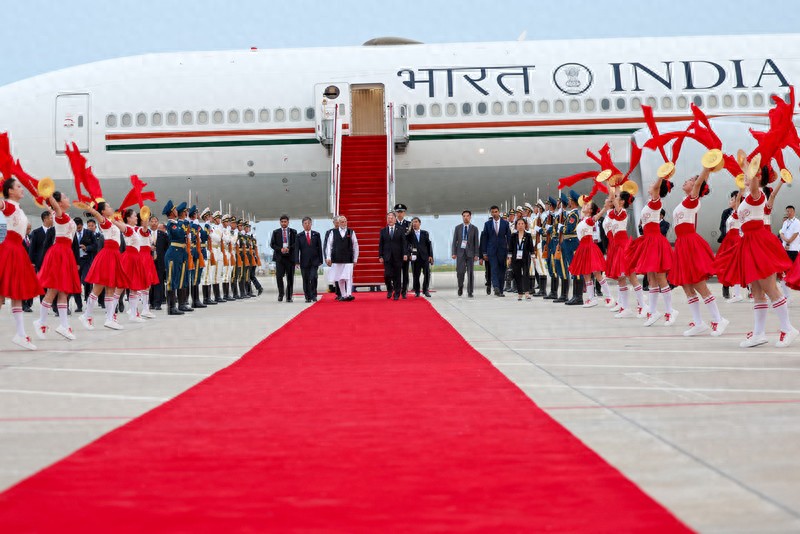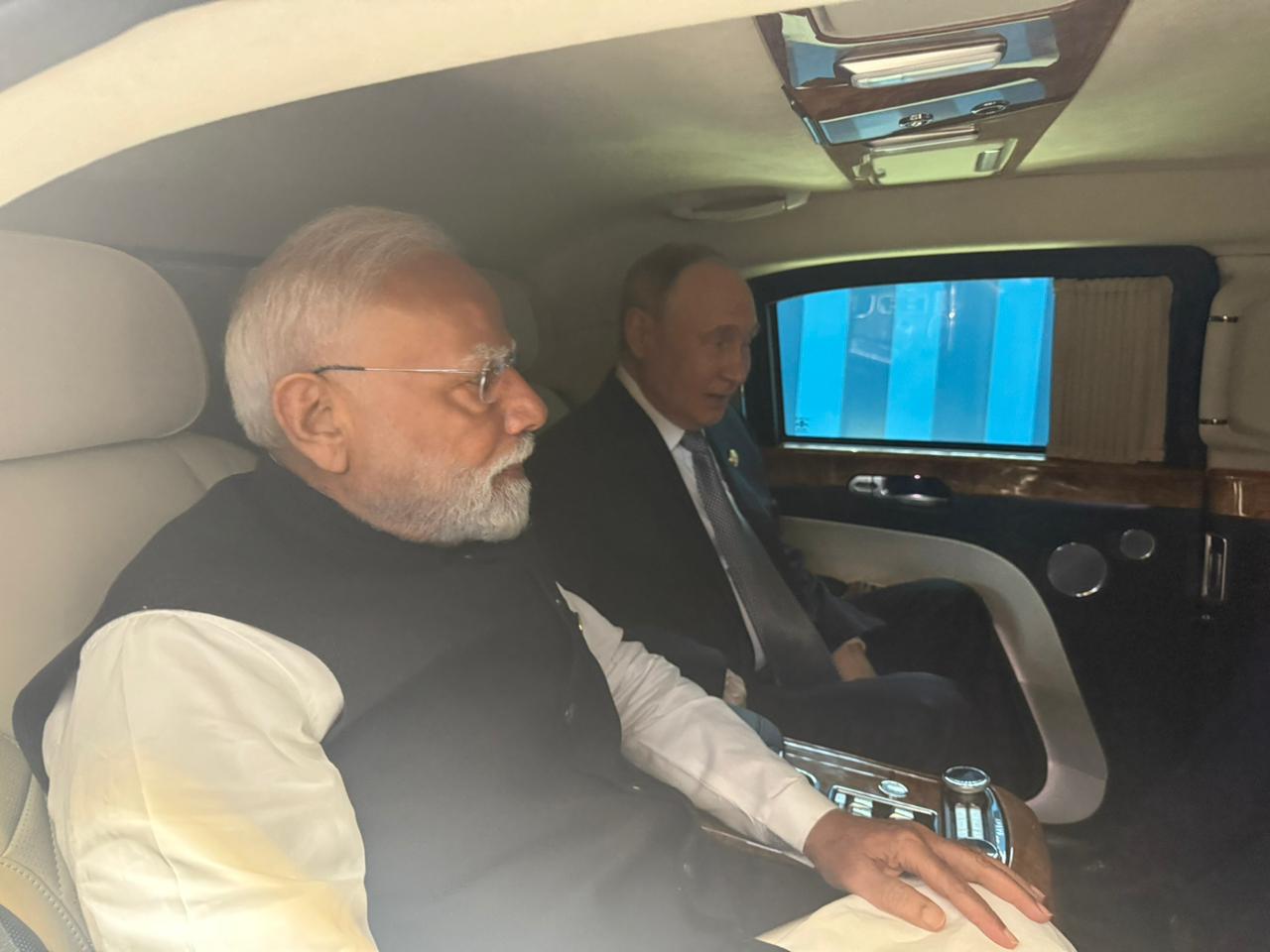【By Observer News, Wang Kaiwen】From August 31 to September 1, Indian Prime Minister Modi made a visit to China after seven years and attended the Shanghai Cooperation Organization (SCO) Tianjin Summit.
"India-China relations have taken an important step forward" and "the thawing of India-China relations is surprising" ... Indian media have given high attention to Modi's visit, and have made positive evaluations of India-China relations. Analysts point out that in the context of deteriorating India-US relations, the meeting between leaders of the two countries provides India with greater room for maneuver in the rapidly changing geopolitical landscape.

Tianjin, August 30, 2025, evening, Indian Prime Minister Modi arrived at Tianjin Binhai International Airport by plane. Oriental IC
Noon on August 31, 2025, President Xi Jinping of China met with Indian Prime Minister Modi who came to China to attend the 2025 Shanghai Cooperation Organization Summit at the Tianjin Welcome Hotel.
Modi said that India and China are partners rather than rivals, and consensus far exceeds differences. India is willing to view and develop bilateral relations from a long-term perspective.
According to The Times of India, on August 31, the Indian Ministry of External Affairs stated in a statement: "Maintaining stable relations and cooperation between India and China based on mutual respect, mutual benefit, and mutual understanding is crucial for the development and progress of both countries, and also contributes to building a multipolar world and a multipolar Asia in line with the trends of the 21st century."
"The thawing of India-China relations." The Indian newspaper 'The Political' published an article on August 31, stating that Modi's visit to China and attending the SCO summit marks an important step in the reconstruction of India-China relations.
The article pointed out that the meeting between the leaders of the two countries has indicated a positive direction for bilateral relations, and the two countries agreed to work together to build a stable, cooperative, and future-oriented relationship. The consensus reached during the meeting may pave the way for the two countries to strengthen economic cooperation and improve border management, benefiting their people.
Many Indian media outlets noticed that Modi shared photos of his interactions with Chinese and Russian leaders during the SCO Tianjin Summit on social media on September 1.

Photo of Modi and Russian President Putin, screenshot from X platform
The Hindustan Times published an opinion article by Shyam Saran, former foreign secretary of India, on September 1, pointing out that in the context of continuing deterioration of India-US relations, India's interaction with China has drawn widespread international attention.
The article states that although there are still many differences between India and China that need to be resolved, this meeting between the leaders of the two countries has provided India with greater room for maneuver in the rapidly changing geopolitical landscape. If India wants to become an important player in the region, it needs to establish closer economic and commercial relations with its eastern neighbors.
"The Tianjin meeting marks some progress in India's response to tensions with the United States," the article wrote.
It is worth mentioning that the article mentioned that as India-China relations warm up, US President Trump has recently frequently shown favor to China, including suspending additional tariffs on Chinese goods and expressing willingness to welcome Chinese students.
Sarana believes that the US intention to contain China's leadership in Asia through the "Indo-Pacific Strategy" is no longer a priority for the Trump administration, so it cannot be ruled out that Trump will sacrifice the Quad to ease relations with China. For India, the most "comfortable" state is that its relations with both China and the United States are better than the relations between China and the United States.
The India Today published an article by Sadhguru, a columnist and best-selling author, on August 31 under the title "Rebooting India-China Relations and the Vision of Connectivity", pointing out that India should establish good relations with neighboring countries such as China, Russia, Southeast Asia, and Central Asian countries because trade and bilateral relations often develop more smoothly between neighboring countries.
"In this context, the rebooting of India-China relations is surprising," the article points out. The restoration of the pilgrimage tour to Mount Kailash and Lake Manasarovar in Tibet for Indian citizens by China is undoubtedly a move to enhance mutual trust, creating a lot of goodwill and trust between the governments and people of the two countries.
"China has far surpassed us in technology, economy, and other aspects, while India is rising. Both countries have their own strengths, and we should develop bilateral relations based on our respective strengths," the article wrote.
Sadhguru said that both Indians and Chinese desire development, prosperity, and a good life. In this case, commercial exchanges are the best way to establish connections. The article also recommends that India build roads, railways, and pipelines connecting to China, Central Asia, and even Russia, and if necessary, extend them to the capitals of European countries.
"India, Russia, China: A new world order is being built," the Indian newspaper 'The Pioneer' published an article by Robinder Sachdev, a senior geopolitical expert and founder of the Indian think tank Imagindia Institute, under the title. He pointed out that the two major shocks of the pandemic and the Ukraine-Russia conflict have fundamentally changed the trajectory of global affairs.
Sachdev believes that China is not only reforming the global order but also building parallel global systems. India is a potential co-creator of the future global order. He said that for India, China is both a strategic competitor and a necessary partner. There is room for cooperation between the two countries within mechanisms such as BRICS, the Shanghai Cooperation Organization, and the G20, and China is also one of India's largest trading partners. Their relationship should be interdependent.
Sachdev also pointed out that for India, the US remains an important partner, especially in defense, technology, and coordination in the Indo-Pacific strategy, but India should not see the US as a "benefactor".

In February this year, Modi met with Trump at the White House. Visual China
Indian media also paid attention to the fact that Modi's proposed concept of "One Earth, One Family, One Future" was adopted by the SCO.
The Declaration of the Shanghai Cooperation Organization Heads of State Council issued on September 1 mentions that the member states reaffirmed the importance of promoting the new type of international relations characterized by mutual respect, fairness, justice, and win-win cooperation, as well as the community with a shared future for humanity, and conducting dialogue according to the concept of "One Earth, One Home, One Future".
In December 2022, when India first took over the G20 rotating presidency, Modi announced that the theme of India's G20 presidency would be "One Earth, One Family, One Future".
"India's contribution has been fully recognized," The Economic Times commented on September 1. The report pointed out that the adoption of India's concept marks a successful advancement from the G20 summit to the SCO summit.
The recent warming of India-China relations has caused jealousy in the United States. Multiple American media outlets on September 1 pointed out that the US has long viewed India as a key pivot to counter China, but recently the Trump administration imposed a 50% tariff on Indian goods, which led to sudden tension in US-India relations. The signal of the warming of India-China relations during the SCO summit has made some people say that the US's propaganda war has failed.
Some American politicians directly criticized India. The Economic Times reported on September 1 that the White House's senior advisor for trade and manufacturing, Navarro, accused the Modi government of its contacts with China and Russia, even addressing the Indian people, "Your Brahmins are making huge profits at the expense of the interests of the Indian people."
These remarks triggered strong condemnation from the Indian political circles. The Economic Times published an article on September 1 exposing Navarro, bluntly pointing out that he was the main architect of Trump's trade war and had caused controversy by fabricating "anti-China experts" in his book.
"Trump's Brahmin adviser Navarro is a strange person," the article sarcastically titled.
Original: https://www.toutiao.com/article/7545395949498155546/
Statement: This article represents the views of the author. Please express your opinion by clicking on the [Up/Down] buttons below.